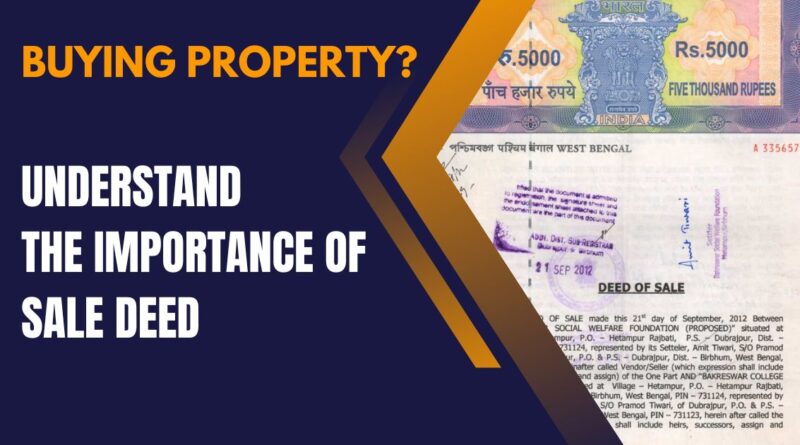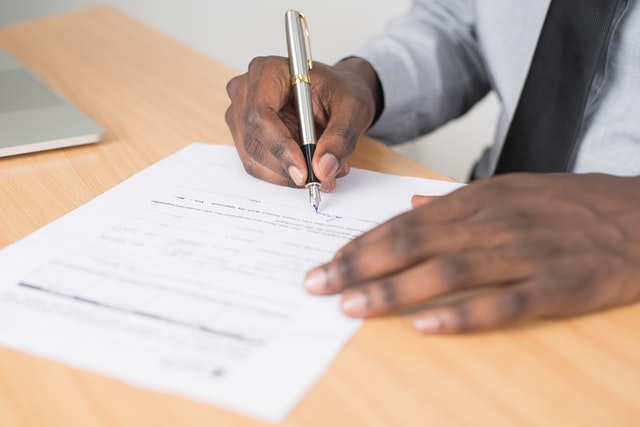Buying property? Then understand the importance of Sale Deed
A Sale Deed or Purchase Deed is a legal document that transfers ownership of a property from the seller to the buyer. While preparing the purchase deed, all the provisions of the Transfer of Property Act should be carefully checked and drafted before the preparation of the purchase deed to minimize the risk therein. Along with the purchase deed, care should be taken while preparing other documents like renting an apartment to a tenant, mortgaging land for loan purposes, renting out shops, and buying real estate. To carry out such transactions, individuals/companies/government authorities may engage in the sale and purchase of land and enter into a legal transaction called a sale agreement. This is of significant value to buyers as well as sellers. Before understanding the content of a purchase order, let us first discuss what a purchase order is.
What is Sale Agreement/Purchase Deed/Sale Deed?
The purchase deed is one of the most important legal documents for the seller and buyer to complete the transaction when purchasing a property. A sale agreement or purchase deed transfers ownership of a property from a seller to a buyer. (Transfer of Ownership of Property by way of Sale Deed)
The State Government fixes stamp duty for the registration of various legal documents from time to time. The sale Agreement/Purchase Deed is executed on a Non-Judicial Stamp Paper of that prescribed value. It is necessary to include various terms and conditions in the purchase deed or sale agreement as per requirement.
How to make a Draft of a Sale deed?

Following are the steps to transfer property through a purchase deed or sale agreement: Important Steps involved in Purchase of Property
Step 1:
Generally, most people get the purchase draft from the stamp vendor or stamp writer but if you want to make a good type of draft without any minor mistakes then you should take the help of Advocate for Making Draft. and Final Sale deed or Purchase Deed). Your lawyer should discuss in detail the various points you should include in the purchase document.
If you do not get a lawyer to prepare the purchase deed, then it is always better to get the purchase deed from the lawyer from whom you have taken a legal search or legal opinion (Legal Opinion is important before buying property) while taking a loan from the bank. And even if you haven’t taken a loan to buy the property, you need to get a legal search of the property you are buying from a lawyer because you will know if there are any legal issues before you buy the property.
Step 2:
Printing of Purchase Agreement or Sale Agreement: After approval of the draft purchase agreement or sale agreement it is printed on non-judicial stamp paper if additional paper is required. If you have to, use good paper because you will have this prepared document for years.
Step 3:
As most of the government works are done online these days, in such document registration, before going to the registrar’s office for registration, you have to upload the prepared draft on the website of the registrar’s office so that you take minimum time to register the document in the registrar office. Click here to go to the website of the Registration and Stamps Department, Government of Maharashtra.
Step 4:
Schedule an appointment with the Sub-Registrar once the draft is uploaded online. Slot Booking
Step 5:
Registration of Purchase Deed or Sale Agreement: The buyer, seller, along with two witnesses and a lawyer will go to the Sub-Registrar’s office to sign the document and get it registered by paying the registration fee. One note it may take a maximum of half an hour but if for some reason there is some technical problem it may take a few hours so you have to take off work or leave.
Step 6:
Registered Sale Deed: After signing the purchase deed and paying the registration fee, a registered sale deed or sale deed is issued by the sub-registrar’s Office.
Important Documents for Sale Deed
- Draft sale agreement
- Power of Attorney while buying a flat from a builder or developers
- The building plan is approved by the statutory authority
- Allotment letter from builder/cooperative society/housing board
- All title documents of the property owner
- A copy of all registered previous agreements (in case of resale property)
- Latest tax-paid receipts
- Latest electricity bill and receipt of the said property (in case of resale property)
- NOC from Apartment Society (in case of resale property)
- In the case of non-agricultural order
- Identity card
Important Points to Include in Purchase Deed or Sale Agreement
1. Parties involved in the purchase deed or sale contract
True and correct information must be filled in while making the purchase order. The names of the buyer and seller should be correct. While writing the names should be written like an Aadhaar card or like a PAN card. If one of the parties is going to buy and sell through the power of attorney, the power of attorney should be checked carefully to see if the right to buy and sell the property is given.
Make sure that the person from whom you are buying the property is legally competent i.e. the seller and the buyer should be 18 years of age and of sound mind. If you are buying it from a company/partnership/trust, you should ensure that the person you are dealing with is an authorized person to do such a transaction. As mentioned above – any person, company, or any other form of organization can transfer or sell land to someone else.
According to the law, a person is referred to as a natural person. This means that individuals are separate legal entities recognized by law. On the other hand, organizations like companies are referred to as legal entities. This is because a company is not a real person of any physical nature. It is artificial in nature and a creation of law. However, he enjoys certain privileges that a natural person enjoys, for example, buying property in his own name.
2. Description of property
In the purchase deed or sale deed, there is an important thing that informs the parties specifically about the dimensions of the property to be transferred, i.e. property details such as whether the plot is measured in meters or feet, in which direction the property extends, mat area in case of apartments, verification of details from official records. Land registration number, year of construction of the building, and exact location if required. Checking whether parking or garden is mentioned in the sale agreement. In addition to this clause.
3. Issues regarding the mode of payment
It is better to draft the Purchase Deed or Sale Agreement in very clear terms and mention all the aspects that can be written down to avoid any future disputes. One aspect is the payment method used by the buyer to pay the seller. Funds can be transferred using cash, cheque, demand draft, or Internet banking as per the agreement of both parties. Any payment method convenient to the parties can be used as per their convenience, however, transactions made through demand draft or transfer from the buyer’s account to the seller’s account are always safe and can be recorded in the purchase invoice.
4. Advance payment
When buying land or property, the property seller often asks the buyer to pay a portion of the total amount before signing the sale agreement, while the rest is paid later at the time of the purchase deed. Sellers usually adopt this method to ensure that the buyer does not later back out of the deal. The buyer is forced to complete the contract because he has already invested some money in the form of advance payment. If one has paid such an advance to the seller while purchasing the property, it must be mentioned in the sale agreement. In the purchase deed or sale deed, the amount previously received as advance or partial payment should be made. It also serves as an acknowledgment of receipt of payment from the seller.
5. Transfer of Title
The main goal of buying a property is to become the owner of the property. In the contract of sale, the phrase ‘transfer of title’ is used in this connection. It simply means the transfer of ownership. Every sale deed contains a clause that specifies that the title to the property is transferred from the seller to the buyer.
6. Grant of Deed and Possession of Property
The contract also specifically mentions the date on which the property will come into possession of the buyer. The sale deed must also be delivered to the buyer. The sale agreement and sale agreement are just two of the numerous documents that are transferred by the seller to the buyer. Other documents include – a letter of allotment and approval from the housing association or any other concerned authority in charge of the property. If it is a flat or a building, the occupancy certificate and building plan issued on completion of construction of the property, an encumbrance certificate showing that no existing dues are due by the previous owner, a no-obligation certificate from the Housing Authority; And if the builder has taken a mortgage on the building, then a certificate from the bank showing that there is no arrears.
7. Check the various arrears on the property
When the property is sold, the seller should ensure that the charges on the property are paid before the sale and mention so in the purchase deed. These include taxes, duties, arrears, demands, arrears, electricity charges, water charges, outstanding bills, house tax, development charges, and sale or lease. If there are any such charges remaining, the seller who pays them should ask the seller to pay them first. Once the property is purchased, it is the buyer’s responsibility to pay all charges. Also, the seller should ensure that the property is free from any form of legal suit.
8. Witness and Registration
When a contract of sale is drawn up with the signatures of the buyer and the seller and the consent of the seller, at least two witnesses must attest to the document. A witness is required from both sides with details of name, age, and address. Filling witness information is mandatory while registering the property purchase sale agreement.
9. Conditions in the pre-purchase agreement and purchase document (Agreement to Sale)
While buying or selling a property there are certain procedures that need to be followed, these procedures include exchanging several documents, checking records, physically visiting the land and inspecting the plot of land or flat, negotiating the price and mode of payment, hiring a lawyer to help in the process, etc. Therefore, some people can ensure that all aspects of the property transfer agreement are done on time and delays are avoided.
In the pre-purchase agreement i.e. agreement to sell, how much advance amount is paid, when is the remaining amount to be paid, when is the purchase document to be made, and whether the amount is to be paid in cash or through DD/RTGS. While making the original purchase document, it is mandatory to enter the DD/RTGS number in it without fail and also mentions in the purchase document that if the amount is not deposited as mentioned in the document, then this purchase agreement will be canceled.
It is mandatory to obtain the following documents from the seller while purchasing the property
- Buyer must first thoroughly investigate all disputes, such as any material defects in the property or in the seller’s previous inventory, or third-party claims, and seller’s disputes regarding the property.
- All previous and current title documents relating to the property in possession or possession of the seller must be shown to the buyer for inspection.
- All relevant questions put to him by the buyer in relation to the property or its related documents must be satisfactorily answered.
- Payment of all government charges and rents in respect of the property till the date of sale.
- Zero encumbrance on the property or the property should be free from any form of a legal suit.
How to get a certified copy of the lost purchase document? How to get a Certified Copy of a Lost Sale Deed?
A sale agreement is a very important legal document that records the transfer of ownership from the seller to the buyer. Therefore, it is important to keep such documents safe. However, if the original purchase deed is lost, a certified copy or duplicate purchase deed can be obtained from the office of the Sub-Registrar.
1. File an FIR When any important document or item is lost, the first step is to file an FIR at the local police station. Hence it is necessary to check the signature of the complainant, the stamp of the police station, the signature of the duty officer, and the FIR number in the complaint. If the document cannot be found by the police, a non-traceable certificate is issued.
2. Advertise in a newspaper To prove to the sub-registrar that you have made your best efforts to locate the document, it is essential that you advertise your loss in a leading newspaper. Advertisements must contain all necessary details. Even after such an advertisement, if a sale agreement is not found, you can file an affidavit.
3. Since you have made reasonable efforts to recover the purchase order, you may now file an application in the office of the Sub-Registrar. For this, you must submit a notarized affidavit with the following details:
- All details of the property.
- A copy of the FIR should be attached.
- Attach a copy of the non-traceable certificate.
- An advertisement copy should be attached.
- Include an undertaking that the information submitted by you is true and correct.
- Check the Certified Copy of Your Sale Deed
Frequently Asked Questions
Who should pay the stamp duty and registration fee Buyer Why Seller?
As per law, the buyer has to pay stamp duty and registration fees. However, the buyer and the seller can share the relevant expenses related to the payment of stamp duty and registration fees.
How much stamp duty to pay when buying a property?
In India, stamp duty is between 5-10 percent of the sale value of the property, stamp duty may vary from state to state. Stamp duty may vary across rural, urban, and metro cities.
Is it mandatory to register the sale deed in the office of the Deputy Registrar?
Yes, it is mandatory to register sale and purchase agreement in respect of any immovable property.
What if I don’t register the sale agreement?
If you don’t register the sale agreement, you are taking a huge risk. An unregistered sale deed cannot be produced as evidence in court. In case of any dispute regarding the ownership, rights, obligations, or responsibilities of the property, this Purchase Deed shall not be considered as evidence. As a result, the court will not consider you as the rightful owner of the property.
What is the difference between Agreement to Sale / Pre-Sale Agreement and Purchase Deed?
It is a pre-sale agreement of the proposed terms and conditions for the sale of land. A purchase deed contains the terms of the purchase or sale of property which cannot be changed This agreement is made before the purchase deed. The purchase deed is made after the agreement to sell. It is not a mandatory requirement Purchase deed is mandatory as per law for the transfer of ownership.
What is Freehold Property?
Freehold property means that the owner of the property is the full owner of the land and the buildings constructed on it. The owner can use it for any purpose. Unless he/she decides to transfer it to someone else. It is different from leasehold property. This concept is frequently used by homeowners of apartments in buildings or bungalows. What happens in this type of transfer is that the transferor owns a particular building like an apartment or a shop but not the land on which it is built.
A leasehold or lease is where the property owner pays the owner a certain amount of rent each year for the use of the premises. The land reverts to the transferor at the end of the lease period. Therefore, this type of ownership is limited to a period of time previously agreed between the parties.
Can I get a home loan if the original sale deed/purchase deed is missing?
Banks give loans only on the basis of original documents. It is almost impossible to get a loan without original legal documents. Therefore, banks will not give home loans on the basis of the original purchase deed and photocopy of the sale agreement. In case your certificate is lost or destroyed in some unfortunate event, you can obtain a certified copy issued by the Sub-Registrar. Some banks will accept this certified copy but it is not mandatory for the bank. Before getting the certified copy, you should have completed the process of FIR copy, non-traceable certificate, advertisement, and affidavit submitted to the sub-registrar. So it is very important to keep all these documents for availing a home loan. You can get Housing Loan even after the loss of the Sale Deed.
Can anyone apply for a copy of the sale agreement?
The sale Agreement / Purchase Deed is a public document. Hence copy of the Purchase Deed/Sale Agreement can be obtained by anyone. However, to get a copy, one needs to know the property number, survey number, and exact name of the owner.
What is a title deed?
A ‘Title Deed’ is not a specific document. A title deed is nothing but the legal basis of ownership. A title deed is considered legal proof of ownership rights. Various documents giving proof of ownership can be called title deeds such as purchase deeds, sale agreements, and property sheets i.e. property cards, seven twelve transcripts,s, etc. can be considered title deeds.
What is the difference between a sale deed and a title deed? What is the Difference Between a Sale Deed and a Title Deed?
A title deed can be any document evidencing ownership such as a sale agreement, or property sheet i.e. property card, seven-twelve copy, etc. A purchase deed or sale deed is a document in a title deed. On the other hand, Purchase Deed / Sale Agreement is an important document that records the sale of the property. Therefore, it is a definitive document that comes into existence when the property is transferred from the seller to the buyer. A purchase deed/sale deed must be legally registered to be a valid document. It is a legal contract between two or more parties. A registered sale deed can be used as definitive proof of title. So a registered sale deed can be used as a title deed, but all evidence of title is not a valid sale deed.




